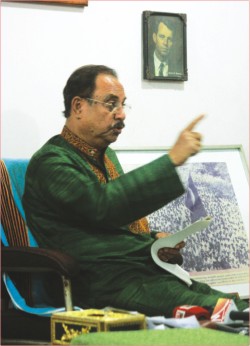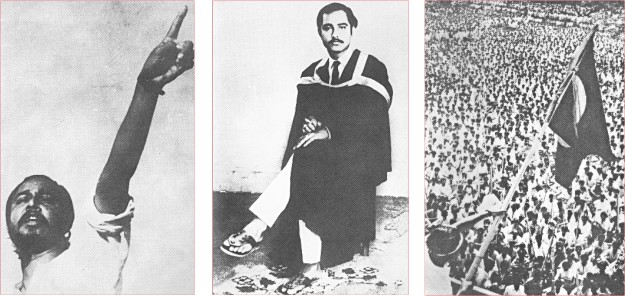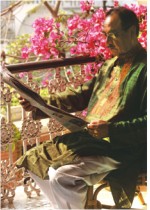Interview
The Power of the Youth:
Building a Better Bangladesh
Elita Karim
 A.S.M Abdur Rob was in his twenties when he hoisted the flag of Bangldesh, for the first time in 2 March 1971. One of the four caliphas (A.S.M Abdur Rob, Shahjahan Siraj, Nur E Alam Siddiqi, and Abdul Quddus Makhon), millions of people cheered the young man while he spoke of his dreams of establishing a liberated country, Bangladesh. Abdur Rob (AR) speaks to the Star Campus (SC) about how, today, the young students can make a difference in the country, with their power to communicate all over the world within seconds, making use of the technology that they are exposed to and most importantly, their ability to dream big. A.S.M Abdur Rob was in his twenties when he hoisted the flag of Bangldesh, for the first time in 2 March 1971. One of the four caliphas (A.S.M Abdur Rob, Shahjahan Siraj, Nur E Alam Siddiqi, and Abdul Quddus Makhon), millions of people cheered the young man while he spoke of his dreams of establishing a liberated country, Bangladesh. Abdur Rob (AR) speaks to the Star Campus (SC) about how, today, the young students can make a difference in the country, with their power to communicate all over the world within seconds, making use of the technology that they are exposed to and most importantly, their ability to dream big.
SC: You were very young when you were fighting for liberation. How do you view the young people today as compared to the ones back in your time?
AR: Those were the days when we were all fighting for one cause. I was only a student back then and like all other young people around me, I would dream of a country liberated and self-sufficient. We would also dream of building something new, creating a fresh set of policies for living a better and secure life in Bangladesh. The young people back then and the students alike had the opportunity to work together and most importantly, had one common target to drive away the enemy. In a nutshell, we fought one lakh Pakistani soldiers and gained independence. Today, the younger people and the students have what we wanted back then, an independent Bangladesh. Unfortunately, the younger ones today also have to deal with corruption and also a lot of dirty politics. Looking back in history of Bengal and this part of the subcontinent, I come across several names in my head who sacrificed lives for their country, like Prithi Lata, Khudi Ram and many more. We also had poets like Tagore and Nazrul whose words would generate lots of energy amongst the elderly and the youth alike, to move forward with zest and determination to protect one's country's honour. However, the young students are not aware of these names or the sacrifices made by them. But you cannot blame them, because the young ones have to face a different kind of problem today. While we knew who our enemy was decades ago, the young students do not know who they have to fight today or how many. Not only do they have to fight just to survive the system today, they also have to deal with the fact that there might be enemies in their families as well!
 |
While speaking to the people |
Right after his convocation |
Hoisting the Flag |
SC: There are many students who believe that their talents will be better appreciated in foreign countries where they can also live a
better life. This is one of the main reasons as to why the 'brain-drain' issue is getting worse amongst the young people in Bangladesh today. What steps can the authorities take to stop this?
 AR: This land is rich in natural resources, one of the most significant being, human power. Despite the fact that we have a huge population in the country, I believe we can come up with unique ideas if we can put the millions of minds and hearts together. There are several organisations and institutions in the country which are working on skill-development and expanding the work force. We should have more of such institutions so that at one point, everyone will have something to do to the best of their knowledge and skills. In addition, I also believe that a proper system can encourage the younger people to stay back in the country. For instance, the son or daughter of a farmer can probably study for a degree in agriculture and research on the existing resources around him or her. Students have to introduce healthy changes and come up with innovative ideas. If the system would allow an agriculture graduate to take a loan and purchase advanced technology to till the land and grow crops, the young graduate would automatically be encouraged and inspired to do something better. In that case, why would the young graduate think of migrating? Therefore, the government should develop plans for the young students in Bangladesh, which will urge them to get into the competition and put Bangladesh on the map. AR: This land is rich in natural resources, one of the most significant being, human power. Despite the fact that we have a huge population in the country, I believe we can come up with unique ideas if we can put the millions of minds and hearts together. There are several organisations and institutions in the country which are working on skill-development and expanding the work force. We should have more of such institutions so that at one point, everyone will have something to do to the best of their knowledge and skills. In addition, I also believe that a proper system can encourage the younger people to stay back in the country. For instance, the son or daughter of a farmer can probably study for a degree in agriculture and research on the existing resources around him or her. Students have to introduce healthy changes and come up with innovative ideas. If the system would allow an agriculture graduate to take a loan and purchase advanced technology to till the land and grow crops, the young graduate would automatically be encouraged and inspired to do something better. In that case, why would the young graduate think of migrating? Therefore, the government should develop plans for the young students in Bangladesh, which will urge them to get into the competition and put Bangladesh on the map.
SC: What does a student need today, to work on ideas and implementing them properly?
AR: I remember visiting a school science fair a while ago where young students in class 6 and 7 were experimenting with light bulbs, electricity and how to generate energy in alternative methods. It shows what our young minds can do if they are guided properly. The students today need a faster internet speed and advanced technology in their fingertips to compete with their counterparts in the rest of the world. Other than technology, the students also need a proper and committed leadership.
SC: How can a young student in Bangladesh eventually work on becoming a global personality?
AR: To be a global personality, one must understand that he or she is not only responsible for his or her home, village and his or her country. Today, a young student must be responsible for the whole world. As much as he or she is required to protect and preserve his or her own traditions, elements, language and culture, he or she must also respect and learn about a foreign culture and set of traditions. With this attitude of accepting the different, the younger people can in fact create yet another revolution in the country. Only this time, the fight will be for knowledge and the young minds of Bangladesh will be the soldiers.
|
